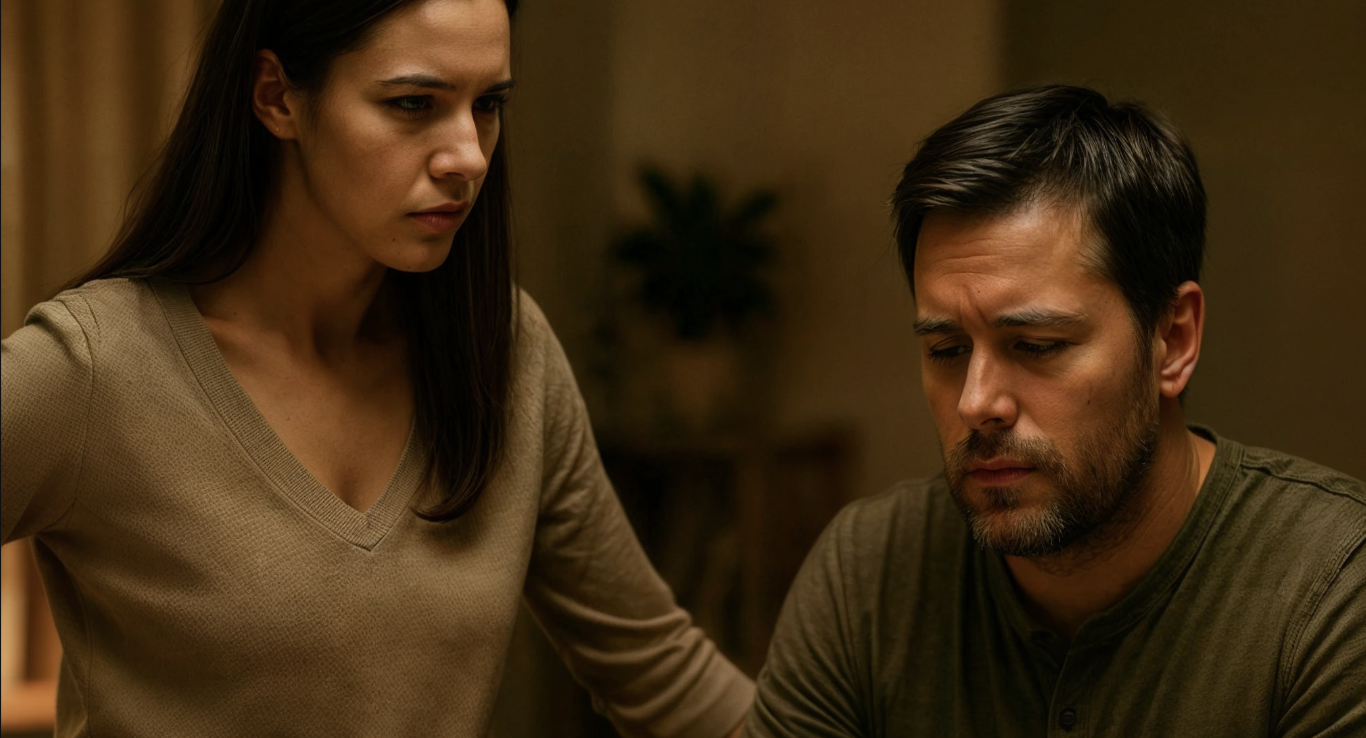A July evening in the two-room apartment on Stroiteley Street was especially stifling. Irina sat in an armchair by the window, turning over in her mind the events of the past few weeks. A thirty-five-year-old elementary school teacher, she had always been observant and good at noticing details that slipped past others. Those traits helped her at work with children, but now they were bringing anxiety into her family life.
Alexander, her husband, worked as the chief engineer at a precast concrete plant. At thirty-eight, he was considered a reliable specialist, earned a decent salary, and was respected by his colleagues. Over seven years of marriage, Irina had grown used to trusting her husband with financial matters. Alexander managed the family budget himself, planned major purchases, set money aside for vacations and unexpected expenses.
At the end of May, her husband brought her unpleasant news:
“Irishka, things are tight with vacation this year. Money’s barely enough, bonuses were cut, taxes went up. Better not plan any trips—we’ll rest at home.”
Irina was upset but didn’t insist. The family budget wasn’t made of rubber, and a teacher’s salary didn’t leave much room to splurge. They decided to spend summer break at Irina’s parents’ dacha, in a village outside Ryazan. Modest, but at least in the fresh air.
The plans changed completely by accident. In mid-June they celebrated the birthday of Igor Semyonovich, Alexander’s colleague from the plant. Irina went to the party with her husband, met the wives of the other engineers, and chatted pleasantly about children and household matters.
After the third toast, Igor Semyonovich got talkative and started sharing workplace news:
“And our Sashka got a nice bonus in April! One hundred and fifty thousand for implementing a new technology. I’m jealous, honestly. I could use money like that myself.”
Irina froze with her glass in her hand. One hundred and fifty thousand rubles? Her husband had said bonuses were cut, that there wasn’t even money for a simple vacation. She looked at Alexander, but he was busy talking with other guests and seemed not to have heard Igor Semyonovich’s words.
They rode home in silence. Irina mulled over what she’d heard, searching for the right words. Finally she decided:
“Sasha, Igor Semyonovich was talking about your bonus. One hundred and fifty thousand—that’s great money! Why did you say there was no money?”
Alexander glanced at her calmly.
“There is money, but I’ve already allocated it. I put it into a deposit at a good interest rate. Later we’ll decide together what to do with it. Maybe we’ll upgrade the apartment or change the car.”
Irina believed the explanation. Her husband had always been rational and knew how to plan ahead. If Alexander decided to set the money aside, then it must be the right call. She just needed to wait.
But a month later, strange things started happening. Alexander became nervous whenever the phone rang. He would answer and step into another room, speaking in a low voice. When Irina asked directly, he replied evasively:
“Work. We’re sorting out problems on the project.”
“Clients are pestering me—everything’s urgent, they want it yesterday.”
On weekends, her husband began going somewhere. He said he was meeting contractors, inspecting sites, consulting on technical issues. He came back tired and irritable. At home he would collapse on the couch, turn on the TV, and ask not to be disturbed.
“I’m working like a dog—can’t I at least rest at home?” Alexander complained.
Irina didn’t push for walks or trips together. She figured her husband was going through a difficult period at work. She spent the summer mostly alone: reading books, meeting friends, tending to the flowers on the balcony.
One August evening Alexander came home later than usual. He ate dinner, showered, then sat down with his laptop in the living room. About twenty minutes later, the phone rang in the kitchen. He hurried up, forgetting to close the computer.
“Hello, yes, I’m listening,” Alexander’s voice carried from the kitchen. “Tomorrow I can’t—family stuff. The day after tomorrow I’ll come by, we’ll take a look.”
Irina wanted to bring him tea, but her eyes fell on the laptop screen. An email was open with an attached file—a blueprint of a one-story house with an attic, a veranda, and a large eat-in kitchen. The design looked attractive and well thought out. At the bottom was a signature:
“House in the Novoselye settlement. Customer — Alexander Mikhailovich Koltsov. Recipients — Svetlana Petrovna and Vera Petrovna Koltsova.”
Irina’s heart skipped. Svetlana Petrovna was Alexander’s mother, a pensioner living in a cramped old one-room apartment in the regional center. Vera Petrovna was his sister, divorced, with an eighteen-year-old daughter. So Alexander had ordered a house project for his mother and sister?
Alexander returned and saw Irina standing by the laptop.
“What are you looking at?”
“Nice project,” Irina said cautiously. “Is this for your mom and Vera?”
He snapped the program shut.
“Oh, that. We were just looking at a plot in that settlement. Mom’s dreamed of getting out of the city for a long time. Nothing serious yet.”
“Why didn’t you tell me? We were going to decide together how to spend the bonus.”
“Irishka, these are just preliminary calculations. If anything works out, we’ll definitely discuss it.”
Irina didn’t press—yet unease settled in her chest. The project was far too detailed for simply “looking at a plot.” And why did Alexander get so nervous when she saw the drawings?
A week later, Irina ran into Galina in a store—an acquaintance from the pedagogy institute. They chatted, and Galina casually mentioned:
“By the way, I saw your husband in the Novoselye settlement недавно. I have a dacha there, I go every weekend. And Alexander Mikhailovich was looking at some buildings with workers. Probably buying or building a house?”
Irina felt the ground tilt under her feet.
“In Novoselye? Are you sure?”
“Of course I’m sure! We even said hello. I asked what he was doing out there, and your husband said, ‘We’re building a house for my mom—she’ll move in soon.’ Good for him, by the way—good children don’t abandon their elderly parents.”
At home Irina couldn’t sit still. So it wasn’t just a project—construction had already started? And why was Alexander hiding it? She decided to find out herself.
The next day, taking time off from school, Irina went to Novoselye. The place was picturesque: a pine forest, a small lake, paved paths between lots. On lot fourteen—according to the address from the drawings—construction really was underway.
The foundation was finished, the first-floor walls were up to window height, and rafters lay on the roof. A construction trailer stood nearby, with men’s voices coming from inside. Irina walked closer.
“When’s the owner coming?” one worker asked.
“Alexander Mikhailovich promised tomorrow,” another answered. “We need to sort out the electricity. The mom and sister are already planning where the furniture will go.”
Irina quietly peered through the half-open trailer door. On the table lay invoices, estimates, contracts. Every document was made out to Alexander Mikhailovich Koltsov—construction of a house for Svetlana Petrovna and Vera Petrovna. Contract amount: eight hundred and fifty thousand rubles.
Eight hundred and fifty thousand! Where had her husband gotten that kind of money? The bonus had been one hundred and fifty thousand; even with prior savings, it clearly wasn’t enough.
Back home, Irina sank into the armchair by the window and waited for her husband. Her thoughts tangled; questions swarmed in her head. Why had Alexander lied? Where did the money come from? And most importantly—why was his wife being kept out of such serious family decisions?
Alexander came back around eight. He greeted her, went to the bathroom, turned on the water. Irina gathered herself and headed toward him.
“Sasha, we need to talk.”
“Just a second, let me wash up,” came from behind the door.
“I was in Novoselye today.”
The water stopped. A minute later Alexander came out with a towel in his hands, his face serious.
“Why did you go?”
“I wanted to see with my own eyes what you’re building there for your mother and sister. And I saw it. Eight hundred and fifty thousand rubles, Alexander! Where did you get that money?”
He sighed heavily, went into the living room, and sat on the couch.
“Sit down. I’ll explain.”
Irina sat across from him, folding her arms over her chest.
“I’m listening.”
“The bonus really wasn’t enough for the whole house. I had to take out a loan for the rest. Seven hundred thousand—secured by our apartment.”
“A loan?” Irina couldn’t believe what she was hearing. “Secured by our home?”
“Temporarily, Irish. Everything’s under control. My salary’s good—we’ll manage. And Mom’s already old, she needs decent conditions. Vera’s suffering in a rented place too.”
“And you decided all that without me? You mortgaged the apartment, took out a huge loan, and didn’t even consult your wife?”
“I wanted it to be a surprise. I thought you’d be happy that your mother-in-law would finally live like a human being.”
Irina stood up and paced the room. Anger and hurt wrestled in her chest with disbelief at what was happening.
“A surprise? A seven-hundred-thousand-ruble loan is a surprise? Have you lost your mind, Alexander?”
“Please don’t shout. The neighbors will hear.”
“I don’t care about the neighbors!” Irina’s voice shook with outrage. “You took out a loan for your family’s dreams! I’m not taking part in this circus—don’t count on me!”
Alexander tried to stand, reaching for her hands.
“Irochka, calm down. We’ll sort it out together. I’m not the enemy of the family—I just wanted what was best…”
“What was best?” Irina cut him off. “Lying to me for months, taking out a loan in secret, putting our apartment up as collateral without my knowledge—that’s what was best?”
“The apartment is in your name anyway—nothing threatens us…”
“That’s not true!” Irina snapped. “If you don’t pay the loan, the bank can demand the apartment be sold to cover the debt. And you didn’t even think to ask my consent!”
Alexander fell silent, realizing he had no arguments left. Irina went into the bedroom, closed the door, and didn’t come out again that evening.
The next morning she got up earlier than usual, dressed strictly and businesslike. When Alexander asked where she was going, Irina replied curtly:
“On errands.”
First she went to a legal consultation. An experienced lawyer, Mikhail Valeryevich, listened and explained clearly:
“According to the paperwork, you have nothing to do with this loan. The borrower is your husband; the guarantor is his mother. The apartment is registered in your name from before the marriage, so it isn’t marital property. The bank can demand repayment only from the debtor and the guarantor.”
“And if my husband can’t pay?”
“Then they’ll go after the guarantor—your mother-in-law. They can also seize the debtor’s property, but they shouldn’t have any claim to your apartment.”
Irina felt relief. At least legally, she was protected from the consequences of her husband’s decisions.
When she came home, she went straight to the computer and began methodically dealing with the family finances. All the joint bank accounts Irina had once opened for convenience were closed. Shared online access to the cards was revoked. Autopayments for utilities, her husband’s mobile phone, the internet—everything was shut off.
Alexander came back from work and didn’t immediately understand what was happening. Only when he tried to open the bank app and saw an access error did it dawn on him that his wife had taken real steps.
“Ira, what have you done? The cards don’t work, I can’t access the accounts!”
“They’re my accounts, Alexander. You decided to handle things on your own—so handle them completely on your own.”
“But what about utilities? My phone? The internet?”
“And what about your seven-hundred-thousand-ruble loan?” Irina answered calmly. “You decided that without me. Now keep deciding without me.”
A week passed. Alexander bounced between work and the construction site, tried to negotiate a restructuring with the bank, and looked for extra income. Construction slowed because the contractors demanded the next payment, and there was no money. The bank called every day, reminding him of the overdue installment.
He tried to pressure Irina through pity:
“Irka, help me. I wasn’t doing it for myself—for Mom and my sister. Family is supposed to support each other!”
“Your family—your mother and sister—can support you, then. I don’t seem to count as family, since nobody considered me.”
A couple of days later Svetlana Petrovna came to their apartment. The sixty-five-year-old woman looked distressed, her eyes red from crying. She rang the doorbell; Irina opened but didn’t invite her in.
“Irochka, dear,” Svetlana Petrovna began. “I understand the situation is difficult. But Sasha tried for us, he wanted to do something good…”
“I understand,” Irina answered briefly, standing in the doorway.
“Maybe you could help him? You have a salary too, and we’re old—we have nowhere to go…”
“Svetlana Petrovna, this is a project you and your son started. And these are your debts. I have nothing to do with that decision.”
“But you’re his wife! You’re supposed to support your husband in a hard time!”
“A husband should have consulted his wife before taking out a loan like that. Since he didn’t, he’ll deal with it himself.”
Svetlana Petrovna tried to step inside, but Irina gently yet firmly blocked her.
“Sorry, but the conversation is over.”
The door closed. Svetlana Petrovna stood on the landing for a moment, sniffled, and left.
Then came a real siege. Alexander’s mother and sister called, and even distant relatives. Everyone tried to guilt Irina, accused her of being heartless, called her a bad wife. Some threatened:
“We’ll tell everyone what a cold-hearted person you are! You abandoned your husband when he was in trouble!”
“You’re destroying the family over money!”
“You’ll live with this burden for the rest of your life!”
Irina listened to the accusations in silence. Then she calmly told each caller:
“Trust in the marriage has been completely destroyed. I’m preparing documents for a court divorce.”
Those words sobered people up. They realized the pressure wasn’t working, and gradually the calls stopped.
Alexander tried to stop her at the last moment:
“Ira, don’t do this! I just wanted to help my loved ones! Is that so bad?”
Irina turned her back to him and headed for the door.
“Helping loved ones isn’t bad. What’s bad is lying to your wife and making decisions behind her back.”
“Wait! We can fix everything—sell the construction, get the money back…”
But Irina had already left the apartment without looking back.
The divorce process took two months. There was no need for a property division—the apartment had been bought by Irina before the marriage using money from the sale of her grandfather’s house. The couple had no shared loans and no major jointly owned property. Only Alexander’s personal debts, to which his ex-wife had nothing to do.
The house in Novoselye remained unfinished. The bank refused to extend the loan because Alexander had missed several payments. The construction company demanded additional payment for materials and labor, was refused, and left the site. The workers took their tools and remaining building materials as partial compensation.
Now Svetlana Petrovna and Vera Petrovna called not Irina, but their son and brother. They reproached Alexander for raising their hopes and then abandoning them halfway. His mother cried into the phone:
“I agreed to be the guarantor! Now the bank is demanding money from me! What am I, an old woman, supposed to do?”
His sister was sharper:
“Some genius you are! You let everyone down, ruined everyone’s life! You should’ve thought first and borrowed money second!”
Alexander tried to explain that he’d counted on his wife’s support, that he hadn’t expected such a turn. But his relatives didn’t want excuses. The dream of a new house collapsed, but the debts remained.
Irina, meanwhile, lived quietly in her two-room apartment. No one shouted at her anymore, no one accused her of lacking “family feelings,” no one made decisions behind her back. In the evenings she read books, met friends, and planned her future without looking over her shoulder at other people’s opinions and ambitions.
She learned an important lesson: from then on, before believing anyone’s claims about money and plans, Irina always asked to see the documents. Trust had to be backed by facts, and pretty promises by concrete actions.
A year passed. Irina occasionally heard news about her ex-husband from mutual acquaintances. Alexander sold his car to partially repay the loan. He moved into a rented one-room apartment on the outskirts. He worked two jobs, trying to settle up with the bank. His mother also had to sell her apartment and move in with her daughter.
“Do you feel sorry for him?” her friends asked.
“Everyone makes their choice,” Irina answered. “Alexander chose to make important decisions alone. Now let him deal with the consequences alone.”
Irina herself got promoted at school, became vice principal, bought a new car, and for the first time in many years felt truly free—free of other people’s ambitions, hidden plans, and responsibility forced on her for decisions she never took part in.
The story ended for Irina the way it should have ended: fairly. The one who makes the decisions bears responsibility for them. And the one who isn’t considered has every right to stay out of the fallout.



